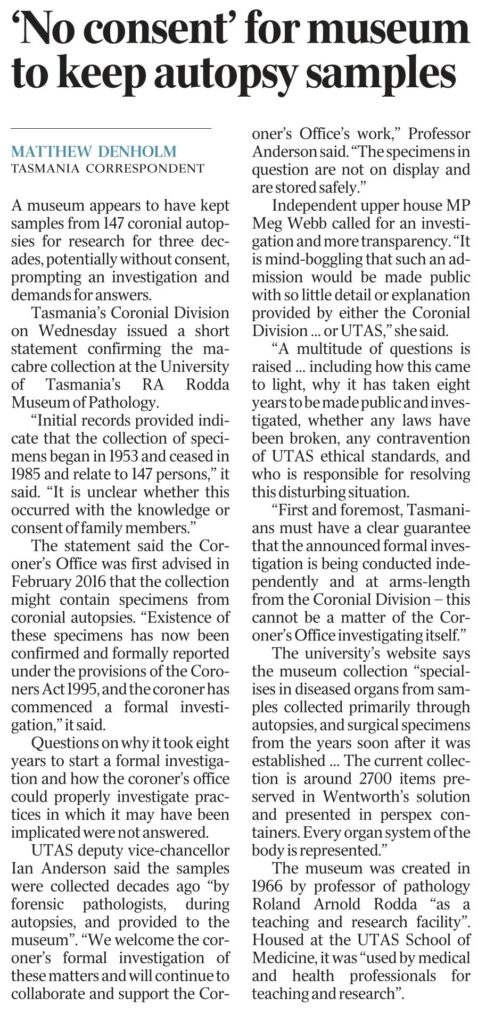Article-‘No Consent’ for Museum to keep Autopsy Samples
The Australian | 4 April 2024; pg 3.
‘No Consent’ for Museum to keep Autopsy Samples
Matthew Denholm
A museum appears to have kept samples from 147 coronial autopsies for research for three decades, potentially without consent, prompting an investigation and demands for answers. Tasmania’s Coronial Division on Wednesday issued a short statement confirming the macabre collection at the University of Tasmania’s RA Rodda Museum of Pathology.
“Initial records provided indicate that the collection of specimens began in 1953 and ceased in 1985 and relate to 147 persons,” it said. “It is unclear whether this occurred with the knowledge or consent of family members.”
The statement said the Coroner’s Office was first advised in February 2016 that the collection might contain specimens from coronial autopsies.
“Existence of these specimens has now been confirmed and formally reported under the provisions of the Coroners Act 1995, and the coroner has commenced a formal investigation,” it said.
Questions on why it took eight years to start a formal investigation and how the coroner’s office could properly investigate practices in which it may have been implicated were not answered.
UTAS deputy vice-chancellor Ian Anderson said the samples were collected decades ago “by forensic pathologists, during autopsies, and provided to the museum”. “We welcome the coroner’s formal investigation of these matters and will continue to collaborate and support the Coroner’s Office’s work,” Professor Anderson said. “The specimens in question are not on display and are stored safely.”
Independent upper house MP Meg Webb called for an investigation and more transparency. “It is mind-boggling that such an admission would be made public with so little detail or explanation provided by either the Coronial Division … or UTAS,” she said.
“A multitude of questions is raised … including how this came to light, why it has taken eight years to be made public and investigated, whether any laws have been broken, any contravention of UTAS ethical standards, and who is responsible for resolving this disturbing situation.
“First and foremost, Tasmanians must have a clear guarantee that the announced formal investigation is being conducted independently and at arms-length from the Coronial Division – this cannot be a matter of the Coroner’s Office investigating itself.”
The university’s website says the museum collection “specialises in diseased organs from samples collected primarily through autopsies, and surgical specimens from the years soon after it was established … The current collection is around 2700 items preserved in Wentworth’s solution and presented in perspex containers. Every organ system of the body is represented.”
The museum was created in 1966 by professor of pathology Roland Arnold Rodda “as a teaching and research facility”. Housed at the UTAS School of Medicine, it was “used by medical and health professionals for teaching and research”.

